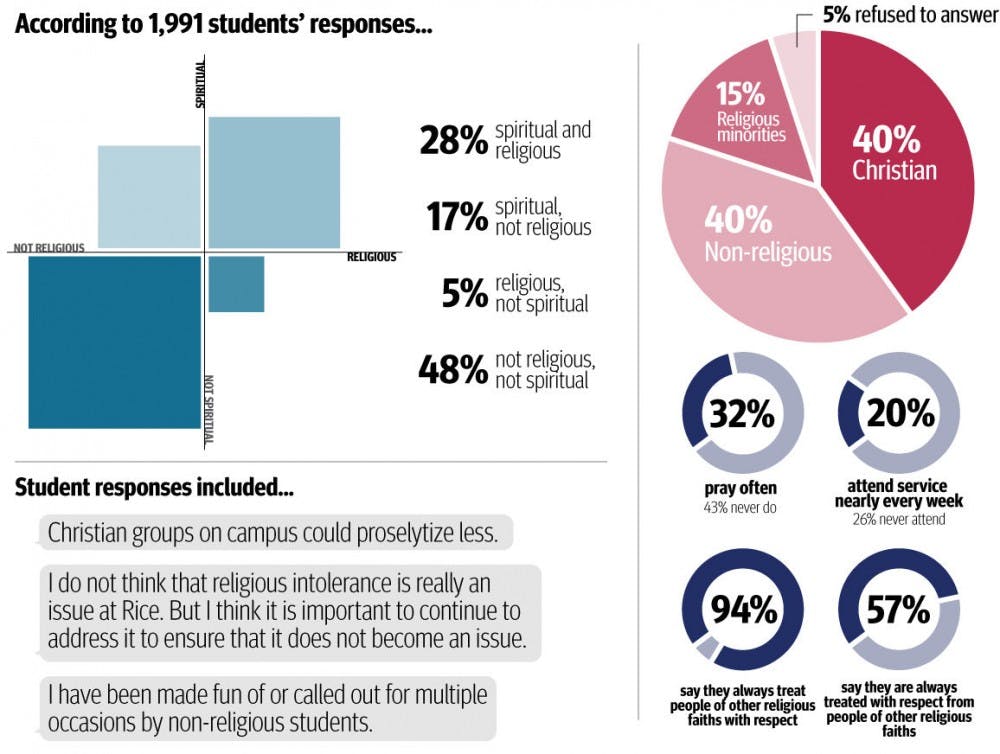Religious diversity survey reveals student opinions of tolerance at Rice

{{tncms-asset app="editorial" id="3ee31b2c-e9d5-11e4-b20d-0ff84c5311ba"}}
Rice University’s Boniuk Institute released the results of a campus-wide survey of undergraduates about religion and religious tolerance at a presentation last week.
Boniuk Institute Director and sociology professor Elaine Howard Ecklund led the implementation of the study, assisted by Laura Johnson, the Institute’s associate director of operations, and several student research assistants.
According to Johnson, the survey was the first thorough effort to understand religious diversity at Rice. Johnson said the impetus for the study was donor and founder of the Boniuk Institute Dr. Milton Boniuk.
“[Boniuk] was really eager to gain a better understanding of what’s going on [at Rice], because it’s sort of seen as a very diverse and tolerant place,” Johnson said. “So let’s look below the surface and see what’s really going on.”
Johnson said many of the survey’s results were expected, such as the fact that religious students had more positive feelings toward their own religions. However, she also said the study led to some important conclusions.
“Understanding where tensions are on our campus will help inform a more productive dialogue around religious tolerance,” Johnson said.
According to a presentation of the survey’s results given by the Boniuk Institute last Thursday, Rice’s student body is dominated by two main groups: Christians and the non-religious, each of which makes up approximately two-fifths of the population.
According to Lovett College sophomore and Junior Interfaith Week Coordinator Bridget Schilling, many students see a divide between religious ideas and their education at Rice.
“I think that the idea of a conflict between religion and science is pretty prevalent on campus, especially because we have such a large population of STEM majors,” Schilling said. “It can be easy to think that religion and science are in conflict, especially with some vocal religious groups in the US being so visible, but I think that we should have a greater discourse surrounding the relationship.”
While the study found that 88 percent of students felt Rice was a safe space for their religious beliefs, it also revealed that a minority of students did not feel completely supported. For example, the presentation said 38 percent of Hindus and 29 percent of Muslims felt campus facilities for their religions were inadequate, compared to only 6 percent of Christians.
President of the Rice Muslim Student Association Zaid Bilgrami said he was grateful Rice has a prayer space for Muslims in the Rice Memorial Center, but that more resources are needed.
“I strongly believe that the facilities as they are not sufficient,” Bilgrami, a Baker College junior, said. “Muslims who try to use the room often find themselves unable to use the room for a variety of reasons. … The best permanent solution would be a separate ‘meditation room’ that Muslims at Rice can use for their daily prayers.”
According to Johnson, the student population views certain Christian groups most negatively.
“If you look around the world, groups that face discrimination are often in a religious minority, such as Hindus or Muslims or Jews,” Johnson said. “But on this campus, the groups that tend to be the most negatively viewed are Evangelical Christians and Mormons.”
Ecklund said the Boniuk Institute is currently working on spreading awareness of the survey results, as well as creating a report for the administration. According to Ecklund, the study should help spur changes that increase religious tolerance on campus.
“Such efforts could include spearheading events that will foster a dialogue around these issues across campus,” Ecklund said. “We are certain that the student body will benefit greatly from the knowledge we’ve gained through this research and we hope that the survey is a launching pad for future conversations around religious diversity at Rice.”
Bilgrami also said there is a need for further dialogue on religion.
“Tolerance is a low bar,” Bilgrami said. “A deeper understanding and appreciation of other viewpoints is missing from Rice.”
More from The Rice Thresher

Rice to support Harvard in lawsuit against research funding freeze
Rice, alongside 17 other research universities, filed an amicus curiae brief in support of Harvard University’s lawsuit against the Trump administration over more than $2 billion in frozen research grants.

Mayor Whitmire discusses ‘the state of Houston’ between audience protests at Baker Institute
John Whitmire’s remarks on the city’s budget, transportation and infrastructure were interrupted twice by shouts from audience members at a Baker Institute event May 29. At the event, which was open to the public, Whitmire spoke about the current state of Houston alongside former county judge Ed Emmett.
Rice reaffirms support for international students after Trump administration targets Harvard
Rice and the Office of International Students and Scholars said in a May 23 email that they are monitoring the Trump administration’s actions towards Harvard to bar the school from enrolling international students. A federal judge temporarily halted the move less than 24 hours later.


Please note All comments are eligible for publication by The Rice Thresher.